Fall 2017 Class Schedule
| Course | Title | Instructor | Lecture | Discussion |
|---|---|---|---|---|
| HUM 205 | The World of Homer | Ann Gunter | TuTh 9:30 - 10:50 am | |
HUM 205 The World of Homer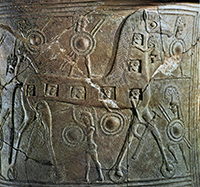
HUM 205: The World of Homer Fulfills Distro 4 (Historical Studies), 5 (Ethics and Values), or 6 (Literature and Fine Arts) What do we know of the world inhabited by the heroes of Homer's epic poems, the Iliad and the Odyssey? Do the poems describe a largely imaginary realm created by their author, or do they reflect a particular period of ancient Greek history -- and if so, which one? This course explores the society, economy, and culture of Iron Age Greece with special emphasis on the Geometric and early Archaic periods, emphasizing what scholars have learned through archaeological discoveries along with study of the poems themselves. Topics include the excavations at Troy, Athens, and other sites; contacts with Egypt and the Near East and colonization in the Mediterranean world; trade, exchange, and the technology of travel; literacy and oral tradition; political communities and warfare; religion, burial practices, and the art of ritual and commemoration. | ||||
Bio coming soon | ||||
| HUM 220-0-20 | Health, Biomedicine, Culture, and Society | Steve Epstein | TuTh 9:30 – 10:50 am | |
HUM 220-0-20 Health, Biomedicine, Culture, and Society
HUM 220-0-20: Health, Biomedicine, Culture, and Society Fulfills Distro 3 (Social and Behavioral Sciences), Distro 5 (Ethics and Values), or Interdisciplinary Distro Present-day medicine and health care are flashpoints for a bewildering array of controversies--about whose interests the health care system should serve and how it should be organized; about the trustworthiness of the medical knowledge we rely on when we are confronted with the threat of illness; about the politics and ethics of biomedical research; about whether health care can be made affordable; about how the benefits of good health can be shared equitably across lines of social class, race, and gender; and about the proper roles of health professionals, scientists, patients, activists, and the state in establishing medical, political, and ethical priorities. By providing a broad introduction to the domain of health and biomedicine, this course will take up such controversies as matters of concern to all. We will analyze the cultural meanings associated with health and illness; the political controversies surrounding health care, medical knowledge production, and medical decision-making; and the structure of the social institutions that comprise the health care industry. We will examine many problems with the current state of health and health care in the United States, and we will also consider potential solutions. | ||||
Bio coming soon | ||||
| HUM 260-0 | Russian Culture in Revolution: From Lenin to Putin | John Bushnell, Clare Cavanagh, Jordan Gans-Morse, Christina Kiaer, Ilya Kutik, Saul Morson, Inna Naroditskaya, Sasha Novozhenova, Yohanan Petrovsky-Shtern, Christopher Pike, and Dassia Posner | TTh 3:30-4:50 pm | |
HUM 260-0 Russian Culture in Revolution: From Lenin to Putin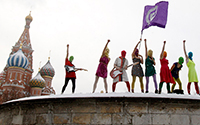
HUM 260-0: Russian Culture in Revolution: From Lenin to Putin Fulfills Distro 4 (Historical Studies), 5 (Ethics and Values), or 6 (Literature and Fine Arts) 2017 is the 100th anniversary of the Russian Revolution. To make sense of the significance of this anniversary, this unique course provides an introduction to modern Russia’s rich cultural history, from the revolutionary fervor of the 1920s to Stalinist repression, from the vitality of official and unofficial art during the post-Stalin “thaw” to the new artistic revolutions that followed the collapse of the Soviet Union. We will grapple with fundamental questions such as how historical and political contexts shape the arts, how the arts have been and can be used to imagine new worlds, how foreign ideologies interact with national cultures, and how scholars’ distinct disciplinary tools and frameworks shape their approaches to the study of Russia’s history, politics, and artistic culture. | ||||
Bio coming soon | ||||
| HUM 325-4-20 | Digitizing Folk Music History | Michael Kramer | MW 3:30 - 4:50 pm | |
HUM 325-4-20 Digitizing Folk Music History
Fulfills Distro 4 (Historical Studies) The United States folk music revival is typically thought of as an antimodern movement with acoustic guitars, camp fires, and "Kumbaya" politics. To study it through digital means, however, reveals important connections between the history of the revival and issues of technology, culture, and politics in the modern world. To investigage these connections, we'll examine this revival through readings, audio listening, documentary films, seminar discussions, and extensive digital analysis. We'll probe what was at stake in the folk revival in relation to American culture and politics; questions of race, class, gender, age, and region; and music-making, memory, and power. No previous digital or musical training is required for the course. | ||||
Bio coming soon | ||||
| HUM 325-6-20 | Ancient Rome in Chicago | Francesca Tataranni | MW M 3:00 - 4:50 pm; W 3:00 - 4:20 pm | |
HUM 325-6-20 Ancient Rome in Chicago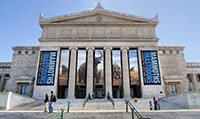
HUM 325-6-20: Ancient Rome in Chicago Fulfills Distro 6 (Literature and Fine Arts) Ancient Rome is visible in Chicago -- walk the city and learn to "read" the streets, buildings, and monuments that showcase Chicago's engagement with the classical past! You'll gain digital mapping and video editing skills as you collaborate on a virtual walking tour mapping Chicago's ongoing dialogue with antiquity. With a combination of experiential learning and rigorous research methodologies, you'll explore architecture, history, visual arts, and urban topography in this quintessential modern American city. | ||||
Bio coming soon | ||||
| HUM 370-3 | Race and Indigeneity in the Pacific | Nitasha Sharma and Hi‘ilei Julia Hobart | TTh 2:00 - 3:20 pm | |
HUM 370-3 Race and Indigeneity in the Pacific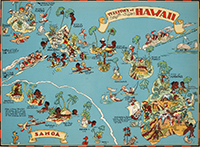
HUM 370-3: Race and Indigeneity in the Pacific Fulfills Distro 3 (Social and Behavioral Sciences) NOTE: This course includes travel to Honolulu, Hawaii`i, the week before fall quarter begins (Sept. 10-17, 2017). Enrollment in this class is by application only. The application deadline is May 10, 2017. Full details are here: http://www.humanities.northwestern.edu/undergraduate/Courses/race-and-indigeneity-in-the-pacific.html Since the so-called Age of Discovery, the Pacific has been conceptualized as a crossroads between the East and the West. By the twentieth century, places like Hawaii`i came to be idealized as harmonious multicultural societies. This class examines how race and indigeneity are constructed within the Pacific using an interdisciplinary approach. Drawing from works within indigenous studies, ethnic studies, and critical race studies, students will address themes of sovereignty, settler colonialism, diaspora, and migration in order to interrogate and problematize the concept of the multicultural 'melting pot' across time. We focus on the impacts of U.S. plantation economies, militarism, and tourism in shaping the triangulation of indigenous, Black, and Asian groups in Hawaii`i and across the Pacific. | ||||
Bio coming soon | ||||
| HUM 370-4-20 | Materials Science and Socioeconomics of Portrait Mummies from Ancient Fayum | Taco Terpstra and Marc Walton | MW 11:00 am - 12:20 pm | |
HUM 370-4-20 Materials Science and Socioeconomics of Portrait Mummies from Ancient Fayum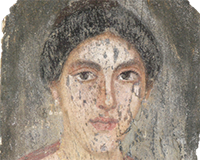
HUM 370-4-20: Materials Science and Socioeconomics of Portrait Mummies from Ancient Fayum Fulfills Distro 4 (Historical Studies) In this unique one-time seminar, we will look at the role scientific examination plays in investigating the production of ancient Egyptian mummy portraits and how these objects fit into the larger socioeconomic context of Roman Egypt in the 2nd century CE. These explorations will be presented in an exhibition at the Block Museum of Art (Paint the Eyes Softer: Mummy Portraits from Roman Egypt) during Winter 2018. Students will have the opportunity for hands-on work in a laboratory environment with an actual mummy from this period to assess how it was made, used, buried and what these data mean in a wider archaeological context. Students will gain insight into and actively contribute to exhibition layout and interpretation, and publicly share their research through a public program in winter 2018. | ||||
Bio coming soon | ||||
| HUM 370-4-21 | Slavery, Religion, and the Philosophy of Freedom in Ancient and Modern Times (RELIGION 379-0 / PHIL 361-0) | Mark Alznauer | ||
HUM 370-4-21 Slavery, Religion, and the Philosophy of Freedom in Ancient and Modern Times (RELIGION 379-0 / PHIL 361-0)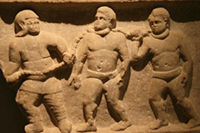
HUM 370-4-21: Slavery, Religion, and the Philosophy of Freedom in Ancient and Modern Times Fulfills Distro 4 (Historical Studies) This course examines one of the most important ideals of our time -- freedom -- within the context of slavery and religion. Rather than assuming slavery and freedom are unrelated opposites, this class focuses on the relationship between freedom and slavery within the context of religion and philosophy from ancient to modern times. Four general periods receive focus: antiquity, medieval, early modernity, and developments since the nineteenth century. The course readings will focus on key themes that include: the role of slavery and freedom in religious traditions; Hegel's conception of freedom and slavery; the Haitian Revolution; slavery and abolition; the causal relation between slavery and freedom; gender and reform movements and their relation to slavery and feminism; the sex-trade and slavery; and recent movements for abolition democracy. | ||||
Bio coming soon | ||||


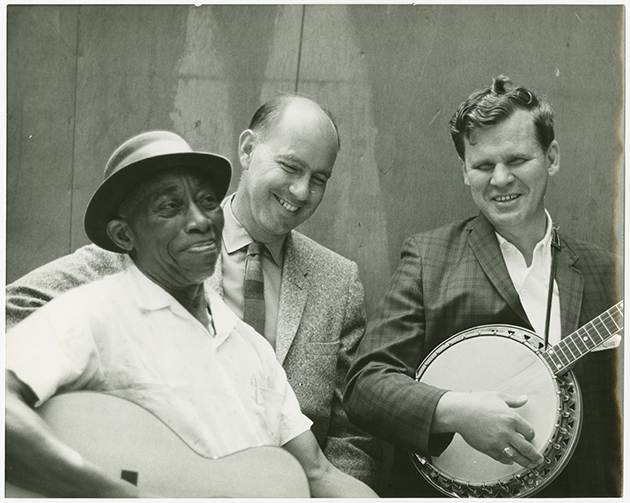 HUM 325-4-20: Digitizing Folk Music History
HUM 325-4-20: Digitizing Folk Music History